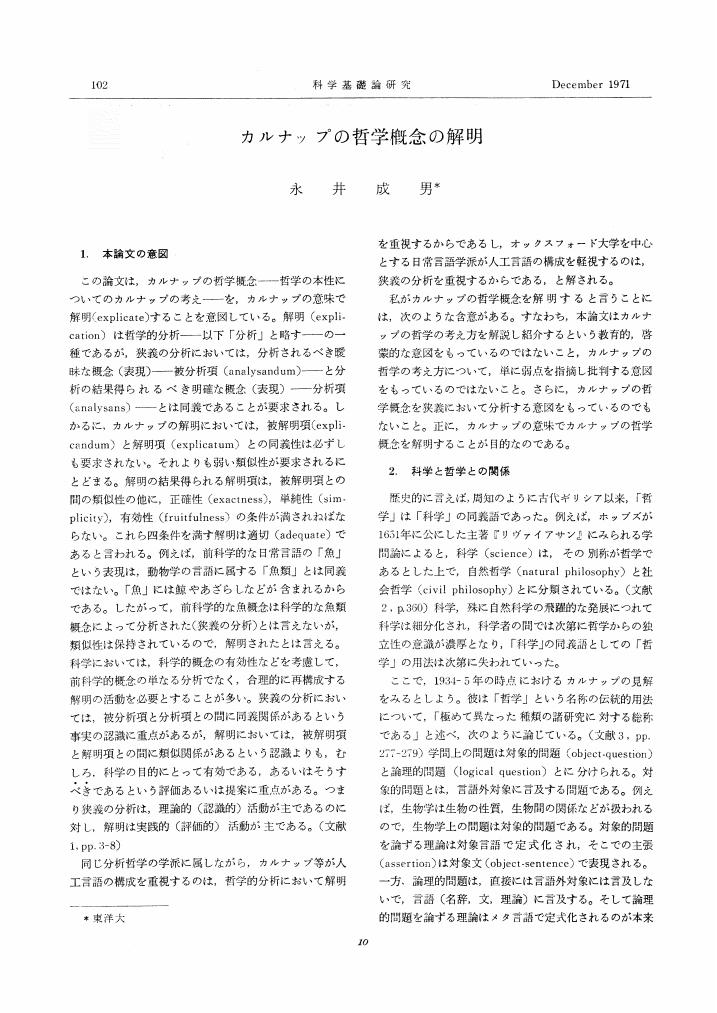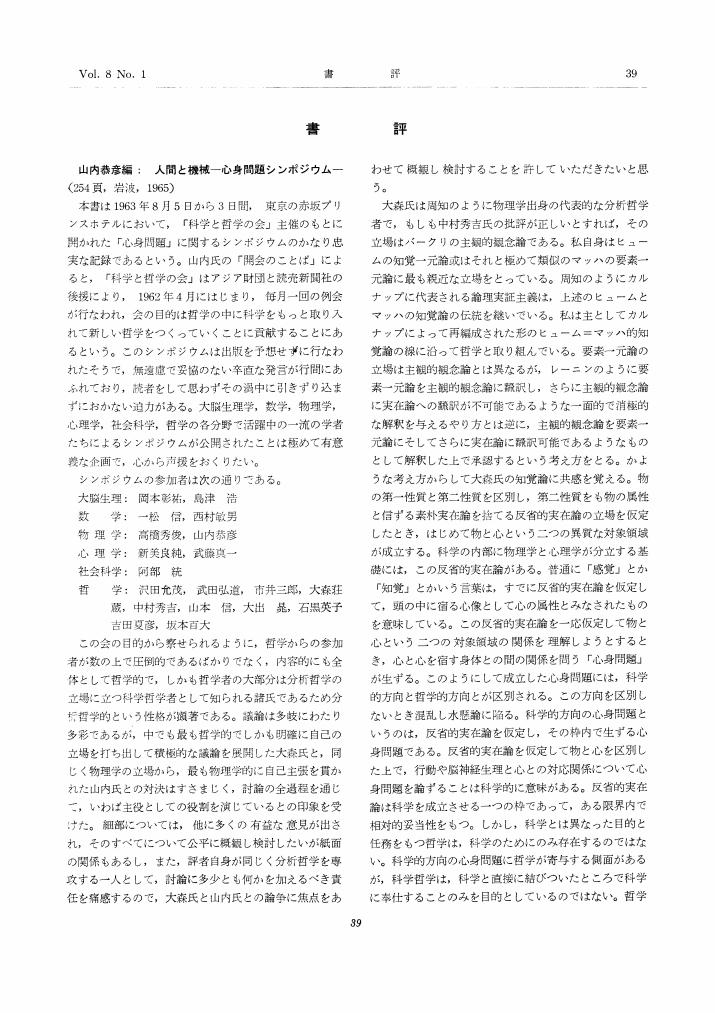3 0 0 0 OA 様相命題論理の意味論的モデルについて
2 0 0 0 OA カルナップの哲学概念の解明
- 著者
- 永井 成男
- 出版者
- 科学基礎論学会
- 雑誌
- 科学基礎論研究 (ISSN:00227668)
- 巻号頁・発行日
- vol.10, no.3, pp.102-109, 1971-12-30 (Released:2010-01-22)
- 参考文献数
- 15
2 0 0 0 理論的認識とイデオロギー--知識社会学の記号論的基礎
- 著者
- 永井 成男
- 出版者
- 岩波書店
- 雑誌
- 思想 (ISSN:03862755)
- 巻号頁・発行日
- no.403, 1958-01
1 0 0 0 OA 科学基礎論とは何か
- 著者
- 永井 成男
- 出版者
- 科学基礎論学会
- 雑誌
- 科学基礎論研究 (ISSN:00227668)
- 巻号頁・発行日
- vol.12, no.3, pp.91-96, 1975-12-25 (Released:2009-09-04)
- 参考文献数
- 9
1 0 0 0 OA 学問分類の方法論上の一考察
- 著者
- 永井 成男
- 出版者
- 科学基礎論学会
- 雑誌
- 科学基礎論研究 (ISSN:00227668)
- 巻号頁・発行日
- vol.12, no.1, pp.25-30, 1974-10-31 (Released:2010-01-22)
- 参考文献数
- 12
1 0 0 0 OA 書評
- 著者
- 永井 成男
- 出版者
- 科学基礎論学会
- 雑誌
- 科学基礎論研究 (ISSN:00227668)
- 巻号頁・発行日
- vol.8, no.1, pp.39-44, 1966-08-10 (Released:2009-09-04)
1 0 0 0 OA 分析のパラドックスの解法
- 著者
- 永井 成男
- 出版者
- 科学基礎論学会
- 雑誌
- 科学基礎論研究 (ISSN:00227668)
- 巻号頁・発行日
- vol.3, no.4, pp.523-530, 1957-12-25 (Released:2010-01-21)
- 参考文献数
- 26
1 0 0 0 OA 論理主義的意味論と語用論の新展開
- 著者
- 永井 成男
- 出版者
- 日本科学哲学会
- 雑誌
- 科学哲学 (ISSN:02893428)
- 巻号頁・発行日
- vol.23, pp.29-37, 1990-11-10 (Released:2009-05-29)
1 0 0 0 OA 因果的様相論理の体系CMについて
1 0 0 0 OA SNk帰納的確率論と等値な意味公準を含むLN'π帰納的確率論について
- 著者
- 永井 成男 大窪 徳行
- 出版者
- The Philosophy of Science Society, Japan
- 雑誌
- 科学哲学 (ISSN:02893428)
- 巻号頁・発行日
- vol.3, pp.27-43, 1970-11-25 (Released:2009-05-29)
- 参考文献数
- 21
In a current paper we constructed the system SNk, which is an extended and generalized system of Carnap's inductive logic. In the present paper we shall show that the new system L'Nπ equivalent to SNk can be constructed within predicate logic of first order with some meaning postulates.Some remarks have been made by Carnap concerning the use of meaning postulates for inductive logic. However, our aim of the use of meaning postulates is altogether different from and ought not to be confused with Carnap's.
1 0 0 0 OA 分析命題の論理的情報について
- 著者
- 永井 成男
- 出版者
- The Philosophy of Science Society, Japan
- 雑誌
- 科学哲学 (ISSN:02893428)
- 巻号頁・発行日
- vol.1, pp.55-70, 1968-10-10 (Released:2009-05-29)
- 参考文献数
- 7
In this paper I shall define the concept logical information distinguished from a customary concept (semantic) information, which is called "factual information" in the paper. In accordance with the contemporary theory of semantic information, if i is an analytic sentence, then i conveys no information. It means thatinf (i) = -log m (i) = 0where i is an analytic sentence and inf is the measure of information. According to our intuition, however, it seems that most analytic sentences convey much more information than "A is A", which is a trivial analytic sentence or tautology. I shall give only one example here.1. Man is man. (S1)2. Man is a rational animal. (S2)Let us suppose that the both sentences Si and S2 are analytic. Then S2 has the same intention, and hence conveys the same amounts of factual information, as S1, whereas S2 has the more complicated intensional structure, and hence conveys much larger amounts of logical information, than S1.







